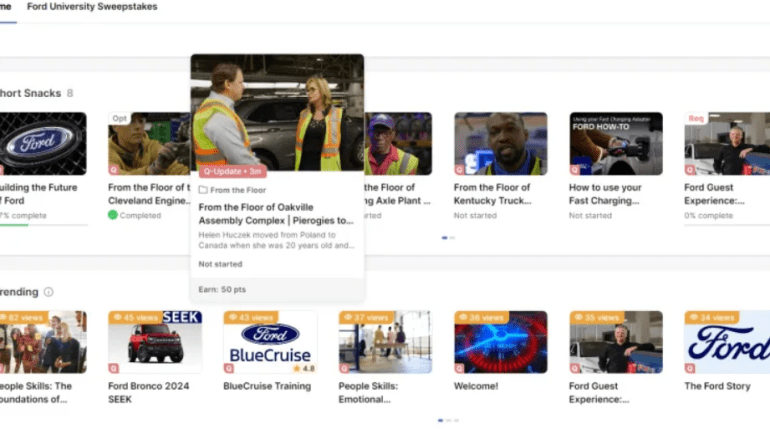- Ford launches “Ford University,” an AI-driven training program for over 3,000 US franchise dealerships.
- The program aims to enhance customer service, engage younger employees, and provide valuable data insights.
- Ford University prioritizes video-based education and gamified learning, departing from traditional training methods.
- Special focus on educating dealership staff about electrified vehicles to address knowledge gaps hindering EV adoption.
- Incorporates AI coaching tools to improve employee knowledge and communication skills, enhancing scalability and innovation.
Main AI News:
Ford Motor unveils an innovative training initiative targeting over 3,000 US franchise dealerships, integrating AI-driven coaching and adopting a Netflix and YouTube-inspired interface. Dubbed “Ford University,” the program aims to elevate customer service, enhance employee engagement, particularly among younger demographics, and furnish both dealers and the corporation with valuable data insights.
“This initiative ensures we’re delivering impactful training that measurably enhances employee skills,” stated Abby Vietor, global director of dealer training and productivity, emphasizing the significance of data-driven strategies previously unexplored. Vietor, a veteran in games learning who joined Ford from Amazon Web Services, spearheads Ford University, a testament to Ford’s commitment to innovation in employee development.
Crucial to Ford’s success, dealership staff profoundly influence sales, performance, and customer satisfaction. The company’s investment in refining dealer experiences underscores its dedication to fostering repeat business and, crucially, educating consumers about electrified vehicles, including all-electric models. The move underscores Ford’s recognition of the pivotal role dealership employees play in shaping consumer perceptions and experiences.
Ford University represents a seismic shift in dealership training, moving away from conventional print-based resources towards a dynamic blend of AI-supported missions, video content, and gamified learning modules. Emphasizing video-based education aligns with contemporary learning trends, reflecting a departure from traditional methods and an embrace of interactive, engaging learning experiences.
The initiative places a particular emphasis on educating dealership staff about electrified vehicles, addressing a critical knowledge gap identified by automakers hindering widespread EV adoption. By prioritizing EV education within Ford University, the company demonstrates its commitment to equipping employees with the knowledge and skills necessary to navigate evolving consumer preferences and market dynamics.
Incorporating AI coaching tools, Ford University pioneers a novel approach to enhancing employee knowledge and communication skills. Leveraging AI’s capabilities, employees engage in simulated conversations and receive personalized feedback, akin to recommendations offered by streaming services like Netflix. This innovative approach not only streamlines training processes but also ensures scalability, positioning Ford at the forefront of leveraging AI in employee development.
Developed in collaboration with Microsoft’s Azure Copilot, Ford’s AI coaching tool harnesses the power of generative pre-trained transformers (GPT), underscoring the company’s commitment to leveraging cutting-edge technologies to drive innovation. Initially targeting front-of-house employees, Ford University is poised to expand its reach, encompassing service personnel and technical departments, reaffirming Ford’s dedication to empowering its workforce for future success.
Conclusion:
Ford’s adoption of AI-driven education and gamification signifies a paradigm shift in dealership training, prioritizing dynamic, personalized learning experiences. By equipping employees with the knowledge and skills to navigate evolving market trends, Ford is poised to enhance customer satisfaction and drive widespread adoption of electrified vehicles, positioning itself as a leader in automotive innovation.

